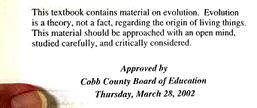

Anyone who’s followed the debate over evolution knows how the word “theory” gets misinterpreted. When scientists call evolution a “theory”, they’re using it as the highest possible compliment. To them, a theory is the most rock-solid type of scientific idea — an explanation of natural events that has been tested and retested and hasn’t yet failed. Of course, in everyday parlance, “theory” means precisely the opposite. “It’s just your theory” is a way of dismissing someone’s idea as a mere opinion. So when Americans — 46% of which currently believe “God created human beings pretty much in their present form at one time within the last 10,000 years or so” — hear evolution described as a “theory,” that’s all they need to dismiss it. Indeed, that’s precisely why the Cobb County Board of Education used the phrase “Evolution is a theory, not a fact” in the stickers they plastered all over their biology textbooks.
Should we care about this language barrier? Yes, argues the particle physicist Helen Quinn in this terrific essay in Physics Today. She argues that when scientists talk publicly about their work — particularly controversial work like evolution — they need to accommodate for the vastly different ways that the public uses these words. Quinn talks about “theory”, of course, but also delves into the many different understandings of other concepts, like “believe” and inferential logic. Here’s a long but cool quote:
What do we mean by “scientists believe that … “? Typically it is something like “Most scientists agree that the preponderance of the evidence favors the interpretation that …, and furthermore, there is no evidence that directly contradicts that interpretation.” Clumsy language perhaps, but it would behoove us to say something like it more often. If we need a shorthand version, we can replace it by “Scientific evidence supports the conclusion that …” Sometimes we should just say “We know that …” In other words, we need to articulate more precisely the state of our knowledge — its authority or uncertainty.
Any good scientist has a conscious range of knowing, from established fact to hunch. We continually reevaluate the status of ideas along that continuum. We serve science poorly when we either over- or underclaim the confidence with which we know something. One of the things that makes us scientists is our intricate examination of knowledge — our understanding of what we know, of how we know it, of what evidence supports it, and of the limits of that evidence. This conscious continuum of knowledge certainty is poorly understood by most listeners, but is taken for granted when we converse amongst ourselves.
When talking amongst ourselves we should also be more careful what words we use. Otherwise we might slip when talking to the public, and say we believe something when we mean something quite different from the everyday usage of the term — and the trouble begins. If scientific belief is set against other beliefs, what differentiates it from them — are we not then just arguing matters of faith?
As Quinn points out, this is an issue not just for scientists, but for anyone who speaks publicly about science — politicians discussing stem-cell research or climatology, journalists who write about these subjects, or even anyone discussing science at a party with people who don’t like science.
I'm Clive Thompson, the author of Smarter Than You Think: How Technology is Changing Our Minds for the Better (Penguin Press). You can order the book now at Amazon, Barnes and Noble, Powells, Indiebound, or through your local bookstore! I'm also a contributing writer for the New York Times Magazine and a columnist for Wired magazine. Email is here or ping me via the antiquated form of AOL IM (pomeranian99).

ECHO
Erik Weissengruber
Vespaboy
Terri Senft
Tom Igoe
El Rey Del Art
Morgan Noel
Maura Johnston
Cori Eckert
Heather Gold
Andrew Hearst
Chris Allbritton
Bret Dawson
Michele Tepper
Sharyn November
Gail Jaitin
Barnaby Marshall
Frankly, I'd Rather Not
The Shifted Librarian
Ryan Bigge
Nick Denton
Howard Sherman's Nuggets
Serial Deviant
Ellen McDermott
Jeff Liu
Marc Kelsey
Chris Shieh
Iron Monkey
Diversions
Rob Toole
Donut Rock City
Ross Judson
Idle Words
J-Walk Blog
The Antic Muse
Tribblescape
Little Things
Jeff Heer
Abstract Dynamics
Snark Market
Plastic Bag
Sensory Impact
Incoming Signals
MemeFirst
MemoryCard
Majikthise
Ludonauts
Boing Boing
Slashdot
Atrios
Smart Mobs
Plastic
Ludology.org
The Feature
Gizmodo
game girl
Mindjack
Techdirt Wireless News
Corante Gaming blog
Corante Social Software blog
ECHO
SciTech Daily
Arts and Letters Daily
Textually.org
BlogPulse
Robots.net
Alan Reiter's Wireless Data Weblog
Brad DeLong
Viral Marketing Blog
Gameblogs
Slashdot Games